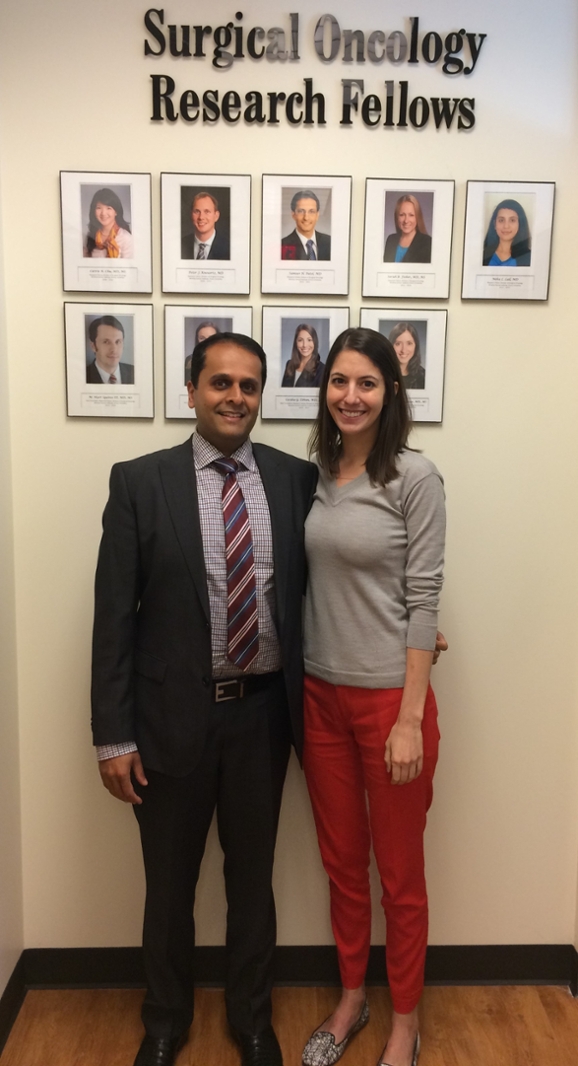MSCR Student's Research Leads to Revised Incidental Gallbladder Cancer Treatment Recommendations; International Trial

Shishir Maithel, MD, FACS and Cecilia Ethun, MD
The Georgia Clinical & Translational Science Alliance (Georgia CTSA) provides opportunities for didactic and mentored clinical and translational research training through the Master of Science in Clinical Research (MSCR) program. By integrating grant submissions and international trial design into her MSCR coursework, Cecilia Ethun, MD, general surgery resident, Katz Foundation Research Fellow, Division of Surgical Oncology, Department of Surgery, Emory University School of Medicine, is using the MSCR program to strengthen her knowledge of the research process and build a supportive foundation for her career. “I completed research in medical school and knew the basics, but I felt like the MSCR would give me so much more, broaden my horizons, and really strengthen my understanding of research. More than anything, the MSCR program gave me the foundation and confidence to start pursuing the things I really wanted to do,” said Ethun.
Ethun’s MSCR thesis project, Surgical Management of Incidental Gallbladder Cancer: Who, When, and How?, has focused on patients diagnosed with incidental gallbladder cancer after undergoing cholecystectomy. Every year, 800,000 cholecystectomies are performed in the U.S. and 1 out of every 150 will have this ‘incidental gallbladder cancer’ diagnosis – the most common method of gallbladder cancer identification in the U.S. “I aimed to develop a more robust predictive model when deciding on treatment options,” said Ethun. Her research focused on coming up with predictive models to help “identify the best patients to go back to the operating room for resection of a little piece of liver, abdomen, and lymph nodes and the best timing for the reoperation.”
Ethun’s MSCR mentor, Shishir Maithel, MD, FACS, associate professor of surgery, Winship Cancer Institute, Division of Surgical Oncology, Department of Surgery, Emory University, Hepatobiliary and Pancreatic Surgery, supports Ethun’s independence and forethought. He stated, "Cecilia’s ability is unprecedented. For the mentor, not actually in the program, I’ve learned a ton through her, leeching off what she was learning from the MSCR instructors and basically teaching it to me. A total reversal of roles. The quality of her work in the lab is like nothing I’ve seen.” Ethun’s work under the guidance of Maithel resulted in a multi-institutional collaborative research group, the U.S. Extrahepatic Biliary Malignancy Consortium (USEBMC), which includes 10 institutions across the country.
The investigations led by Ethun with support and mentorship from Maithel have resulted in three peer review publications:
- A novel pathology-based preoperative risk score to predict distant and locoregional residual disease and survival for incidentally discovered gallbladder cancer: A 10-institution study from the US Extrahepatic Biliary Malignancy Consortium, Journal of Clinical Oncology
- Association of optimal time interval to re-resection for incidental gallbladder cancer with overall survival: A multi-institution analysis from the U.S. Extrahepatic Biliary Malignancy Consortium, JAMA Surgery
- Routine port-site excision in incidentally discovered gallbladder cancer is not associated with improved survival: A multi-institution analysis of 449 patients from the U,S. Extrahepatic Biliary Malignancy Consortium, J Surgical Oncology
Presentations and Publications Turn International Trial
Ethun used skills developed in the MSCR Scientific and Grant Writing course to apply for an award which allowed her to attend the American Association for Cancer Research’s joint venture with American Society of Clinical Oncology for a week-long intensive cancer clinical trials workshop. This workshop targets clinical oncologists and surgical oncologists. In a small group atmosphere with cancer clinical trials experts, Ethun came back to Emory with a fully-written protocol to share with USEMBC. “The workshop is only geared towards people who have completed their training – they are in fellowship and/or are attendings. She is the first-ever surgical resident to attend,” said Maithel.
“Because of the rarity of the disease [incidental gallbladder cancer], we are hoping to open the trial internationally to assess the effect of perioperative gemcitabine and cisplatin versus surgery alone on overall survival in patients with incidental gallbladder cancer. We are currently in the process of working out logistics before submitting the final version to the NIH National Cancer Institute (NCI),” said Maithel. This trial will be critical in helping to determine how best to treat patients with this disease and determine which patients might benefit most from perioperative therapy.